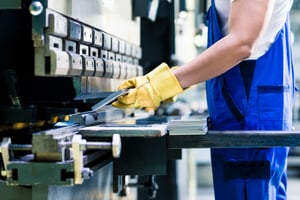 Drew Greenblatt, Marlin Steel’s CEO and the SMB Chairman for the National Association of Manufacturers (NAM) executive board, recently appeared on Fox News’ Making Money segment alongside Ned Ryun, the CEO of American Majority, to discuss the optimism among small-to-midsize business (SMB) manufacturing companies in America.
Drew Greenblatt, Marlin Steel’s CEO and the SMB Chairman for the National Association of Manufacturers (NAM) executive board, recently appeared on Fox News’ Making Money segment alongside Ned Ryun, the CEO of American Majority, to discuss the optimism among small-to-midsize business (SMB) manufacturing companies in America.
In the segment, the boost in confidence among SMB manufacturers is largely attributed to the election of President Donald Trump and his pro-industry stance on setting policy. As Charles Payne, the segment’s host, said:
“You know I’ve been pointing out all year long signs of a burgeoning renaissance in manufacturing. And it was sparked by the election of Donald Trump. Those animal spirits were seen immediately in optimism surveys—including the National Association of Manufacturers and as you can see, it’s been holding even as GOP leadership has stumbled of late.”
The election of a pro-manufacturing president has improved optimism among SMB manufacturers. In a bar chart Payne showed on his broadcast, he highlighted the optimism index of the NAM’s Manufacturing Business Outlook among small-to-midsize manufacturers as 90% positive for Q1, Q2, and Q3 of 2017—a far cry from the 56-61% positive outlook for the same period in 2016.
The Trump Economic Agenda and the Manufacturing Renaissance
Payne continued the section by introducing Drew to his audience and asking the question: “I look at the data. I look at it very closely. What we’re seeing is indeed a manufacturing renaissance. How important is it now that the rest—that parts of the Trump Economic Agenda go through?”
Drew’s answer was that “it’s hugely important.” Right now, small to midsize manufacturers face a disproportionate level of regulatory and tax burdens that, frankly, make it incredibly difficult for them to keep their doors open—let alone grow. This has led to more conservative operating procedures as manufacturers try to scrimp and save instead of making bold investments in their technology, training, and people.
As Drew points out in the interview:
“Our nation, our factories, are like a coiled spring. There’s such optimism. There’s so much cash on the sidelines. That’s all going to come off the sidelines, it’s going to be invested back into factories—buying new equipment, building new factories, getting more automation, hiring more people—there’s a tremendous manufacturing renaissance burgeoning. It’s exciting, this is really an optimistic time for us. Matter of fact, National Association of Manufacturers does a quarterly survey. Three quarterly surveys in a row since the president was elected have been over 90% on average. It’s a stunning number. We’re enthusiastic about the new paradigm being unveiled. These tax reforms are gonna be huge!”
The tax reforms Drew mentioned are part of an economic plan to cut the average tax rate among small manufacturers from around 40% to 25%. This will help to free up a significant amount of money that smaller businesses can use to pay for other things—like adding new equipment, people, and facilities so they can grow.
As manufacturers grow, so, too, do manufacturing job opportunities. Additionally, these aren’t just bottom-rung, minimum wage jobs—they’re jobs that pay a real living wage and benefits that grow the middle class. In fact, according to data cited by the NAM, “in 2015, the average manufacturing worker in the United States earned $81,289 annually, including pay and benefits. The average worker in all nonfarm industries earned $63,830.” That’s a difference of $17,459 a year in pay and benefits!
This can mean the difference between a family being able to afford a house in a good neighborhood with a car in the garage and being barely able to scrape by with federal assistance.
Right now, manufacturers have a unique opportunity to work with a presidency that is overwhelmingly pro-manufacturing to create policies that will help American businesses grow. It’s time to take advantage of this opportunity and let the policymakers know what will help the American economy and the middle class be more prosperous.



.gif)


